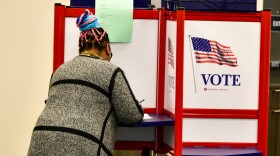Louisville Metro Public Health can provide new syringes to people regardless of whether used syringes are exchanged, according to the state Attorney General’s Office.
Louisville’s health department is operating what’s called a needs-based negotiation model, which provides multiple clean syringes regardless of whether participants bring in dirty ones.
The opinion issued Monday was requested by Senate President Robert Stivers, a Republican from Manchester.
In June, Stivers sent a letter to Kentucky Attorney General Jack Conway questioning whether Metro Public Health officials are in violation of state law by not requiring participants to bring in used needles in order to receive clean ones.
Earlier this year, the General Assembly approved a bill intended to address a spike in heroin use in the state. The legislation included a provision allowing local governments to establish needle exchanges, which Louisville Metro promptly did once the law took effect.
In a previous report by WFPL, Stivers said he believed not requiring participants to exchange dirty syringes for clean ones violated legislators’ intentions for the law. He also said not requiring a one-for-one exchange sets a bad example.
“What good does it do to just hand them out and allow those needles to stay in the system, to be dropped or placed in a garbage can or handed to somebody else?” he said.
But, in his opinion, Conway writes that “exchange” does not require a quid pro quo exchange of syringes. Conway said a program may exchange a syringe for a promise to participate in the program, and that is sufficient for an “exchange” in the ordinary sense of the term.
Conway concluded his opinion by stating that the program may provide syringes to participants for whatever consideration it deems appropriate, which may — but does not necessarily include — a requirement to exchange syringes in order to obtain more syringes.
The Louisville program has had more than 1,500 participants since beginning in June, according to Metro Public Health. More than half of the participants checked for hepatitis C tested positive. The program has also referred 93 participants to drug treatment.
Dr. Sarah Moyer, interim director of the Louisville Metro Public Health, said in a statement that the department was pleased with the opinion.
“The ‘need-based negotiation model’ is a best practice across the country proven to reduce the spread of HIV and hepatitis C,” she said. “Our goals are to prevent the spread of those diseases in our community and to stop people who inject drugs from sharing and reusing needles. The program is working.”
Stivers could not be immediately reached for comment.







